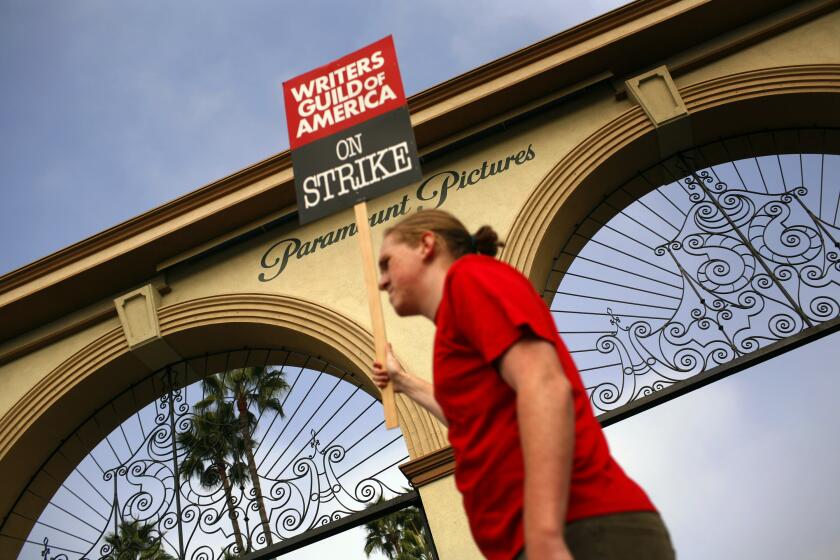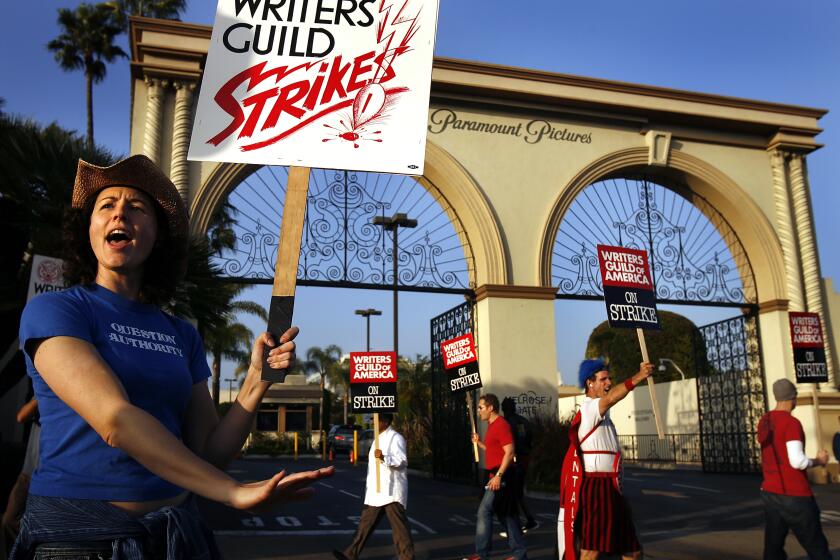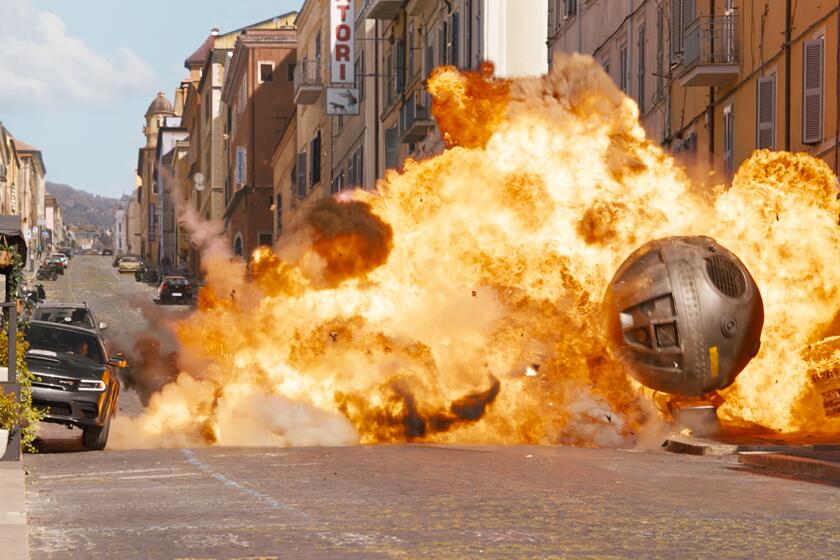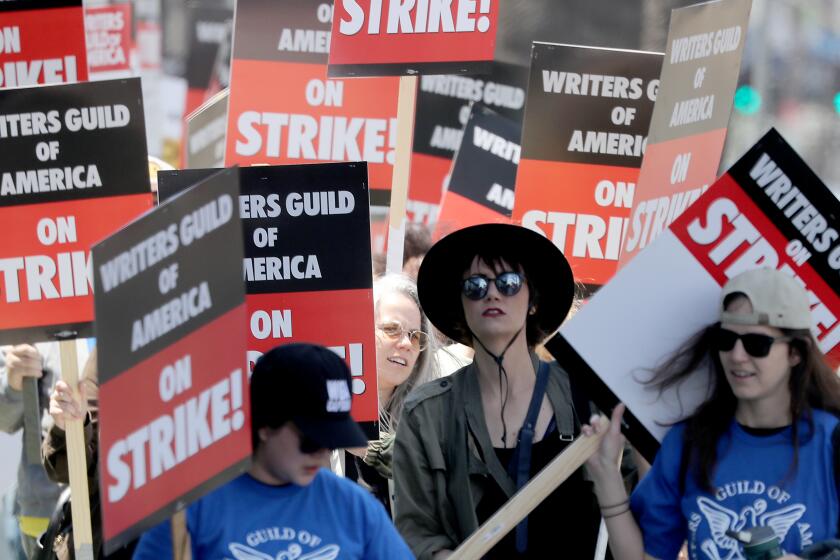‘It’s just pure chaos’: Top Hollywood showrunners explain the writers’ strike

- Share via
The Writers Guild of America called on their members to launch a strike on Monday night after the contract negotiation period with major studios ended without a new deal in place. The walkout will likely result in a halt of production on most TV shows produced in Hollywood for the first time in 15 years.
Last month, members of the guild voted overwhelmingly, at 98%, in favor of a strike action if the guild and the Alliance of Motion Picture and Television Producers, which represents the major studios, failed to reach an agreement on a new deal by the impending contract expiration at midnight Monday.
This critical moment over writers’ compensation in the age of streaming ignited a passionate discussion on the issues at play recently when The Times’ senior television writer Yvonne Villarreal gathered the minds behind six of the most talked about TV shows — Bill Lawrence (“Shrinking”), Craig Mazin (“The Last of Us”), Janine Nabers (“Swarm”), John Hoffman (“Only Murders in the Building”), Ramy Youssef (“Ramy”) and Liz Tigelaar (“Tiny Beautiful Things”) — for one of The Envelope’s upcoming Emmys Roundtables. Here’s what they had to say about residuals, the rise of “mini rooms” — in which small groups of writers (who the WGA claims are often underpaid) are assembled to create episodes before the show is actually greenlighted — and the broken pathways of growth for new writers. The full video of this interview segment will be coming shortly. It was originally recorded as part of our Emmys Roundtable conversations debuting on The Envelope in the coming months.
The 2023 writers’ strike is over after the Writers Guild of America and the Alliance of Motion Picture and Television Producers reached a deal.
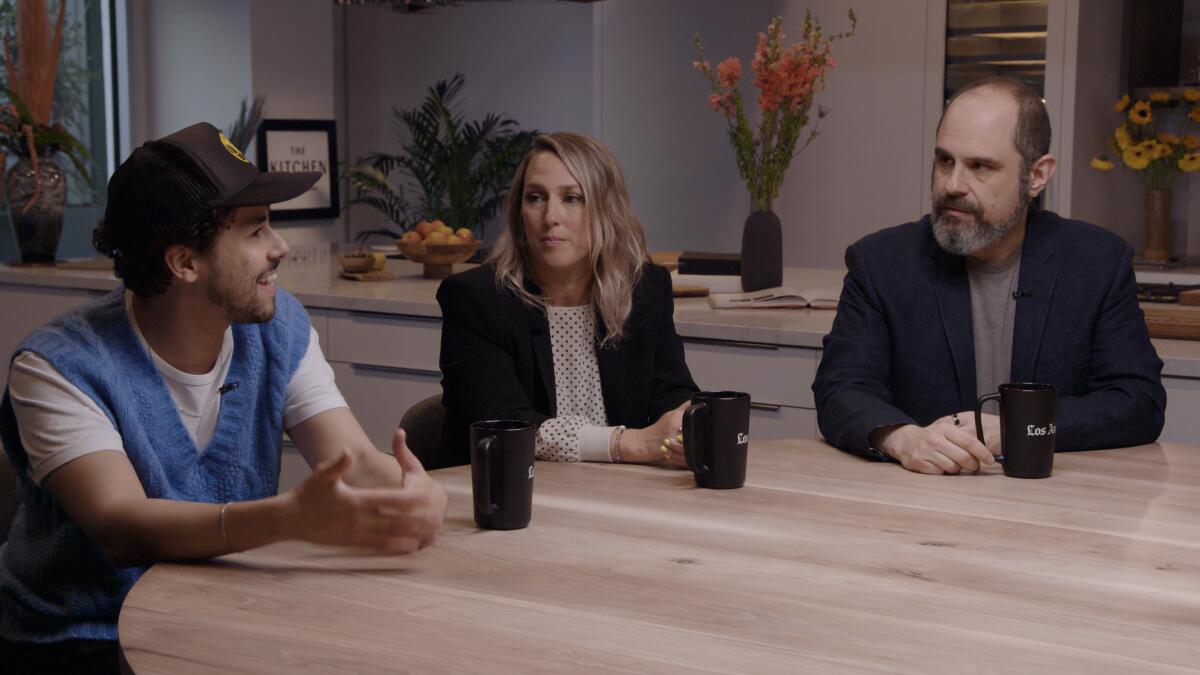
This is a critical year for writers when it comes to compensation in the age of streaming. Top concerns have been residuals in streaming, the rise of mini rooms, shortened seasons. What do you want out of this moment?
Lawrence: [With] residuals, the real conversation is [that] TV writing would be in danger of being only for young men and women whose families could support them. I remember I sold spec scripts to “The Nanny” and “Boy Meets World” when I was out here, and I could survive off those [for years] while trying to be a writer. And if that goes away, this will become a business that you can only do if your parents are well-off enough to help pay your rent and support you while you get to a point that you can support yourself.
Mazin: And the whole mini room thing, just so people understand, it used to be that a writer would come up with an idea, write a pilot, maybe you would shoot the pilot, and then the network would say ”We’re making a series,” at which point you would hire a whole bunch of people to figure out what the season is and you’d all work together. And now they say, “OK, why don’t you hire a bunch of people to figure out the season, then we’ll tell you if we’re going to do it. And if we do it, most of you are fired anyway.”
Tigelaar: “And we’re going to pay them WGA scale.”
Mazin: “And we’re going to pay you nothing.”
Lawrence: And they’ll take it because there are no other gigs.
Mazin: I was in the guild, I was on the board. And I remember very distinctly how everything went down in 2007. And this feels different in the sense that I think even the companies understand on a fundamental level that they have f— up. It’s almost like someone finally pointed it out to them and said, “You’ve just blown out the foundation of your own house and now the whole thing’s crumbling down around you.” They know they have to fix it too. I don’t know what’s going to happen. I don’t know if it’s going to be a strike. I don’t know how long that strike would be if we have one. But I think this is one of those times where even the companies know, “OK, we’ve gone too far.”
Streaming has transformed television and led to a surge in content, but it also has squeezed Hollywood writers. Five Writers Guild of America members share their stories.
Lawrence: The bummer is that they’re so streamlined, these companies, into corporate entities, where I feel like in old times they were at least inhabited by, if not artists, art lovers.
Mazin: Yeah it’s a tough job because you’re not just working with Warner Bros. and Disney, there’s also like, Apple. Apple has more money than most nations. So it is a different thing. And yet they all are together as one thing called the AMPTP, and we’re over here as the WGA. Obviously I hope for the best, but the people that I’m rooting for the most are the people that need to be able to come up. We need to be able to raise kids up. My parents were public school teachers. I grew up on Staten Island. The Pete Davidson part of Staten Island, not the Colin Jost part of Staten Island. And when I came out here, I had nothing. I started calling up temp agencies. I was like two weeks away from having to live on the street. [But] you could still make your way and that is being eliminated.
Nabers: And also, people are not able to know what set is like when they sell a show. The mini rooms have blocked the growth of people. I had a boss leading a huge production who had never been on set before and that is crazy. We’re setting people up for failure. So even with my mini room, which was 14 weeks, I went to Amazon and I was like, “Listen to me, this is the only all-Black room you’ve ever had. These writers are going to set.” I don’t care if they have to stay with me — which some of them did in Atlanta —which should not have to happen. But you just make it work because I refuse to let this story editor who’s never been on set before miss this opportunity.
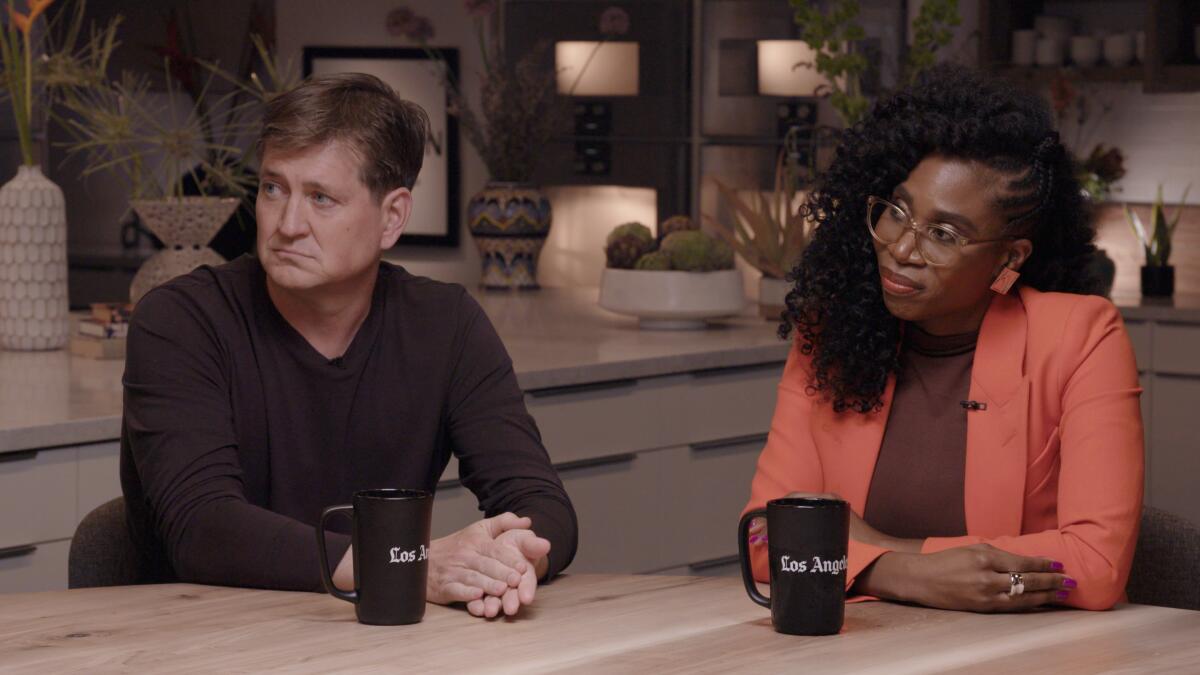
Lawrence: Ramy and I were talking about this, because there’s understandably so many horror stories about bigger-than-life people that are awful or sketchy in Hollywood. But almost everybody, I bet even at this table, was mentored by somebody. And mentorship is such a cool, big thing out here. I got taught how to edit, showrun, grip and block by Gary Goldberg, who passed away, but because I got to be on set the whole time, with him going “This is how you do this, this is how you do this...”
The Writers Guild of America is adding pressure on Hollywood studios, highlighting how their shows and streaming platforms will be affected by a strike if it happens on May 2.
Mazin: Also the job is to write for production. How do you know how to write for production if you’ve never experienced production? So people are getting a third of the job experience and then being told “You have to go out and get another job where you only have a third of the experience to do it.”
Youssef: This issue has become really talked about as the WGA is getting everything together. And I realized that since I’ve started making TV shows ... And right now, I’m working on my third one ...
Lawrence: That’s so annoying. What are you, like, 27? That’s so annoying.
Youssef: No, but I realized a lot of what people have been saying, I’ve actually never even experienced because I’ve been in a position where I’m in it. I’m running it and I go to set. And the idea of being able to bring the writers to set I’m like, “Dude, I’m fighting for a higher-quality lunch.” Like, I don’t even know what you’re talking about. And so I was seeing these issues that people were bringing up and I’m like, “Whoa, the industry used to be like that?” I’ve only done streaming. So I feel like I’m already experiencing what that end of the stick is. So I’m hearing you talk about [residuals] and I’m like ... the only way I’ve been able to feel like I could support myself is acting in it and writing in it and directing it. And doing every part of it.
Lawrence: Also still going on the road ...
Youssef: And still going on the road and doing stand-up between seasons. And I’m trying to get close to Bill ... I might need to borrow money.
Mazin: That’s why he showed up?
The last strike cost $4.5 billion in today’s dollars. That’s why the studios need to stop preparing for the next one and start trying to prevent it.
Nabers: There are people in this industry who are very rich, who abuse power and abuse mini rooms, and they hire all these writers and they take all of their outlines. And then as soon as the contract is done, they take their work and they put their name on it and those people are erased. And that is a fundamental problem with this industry.
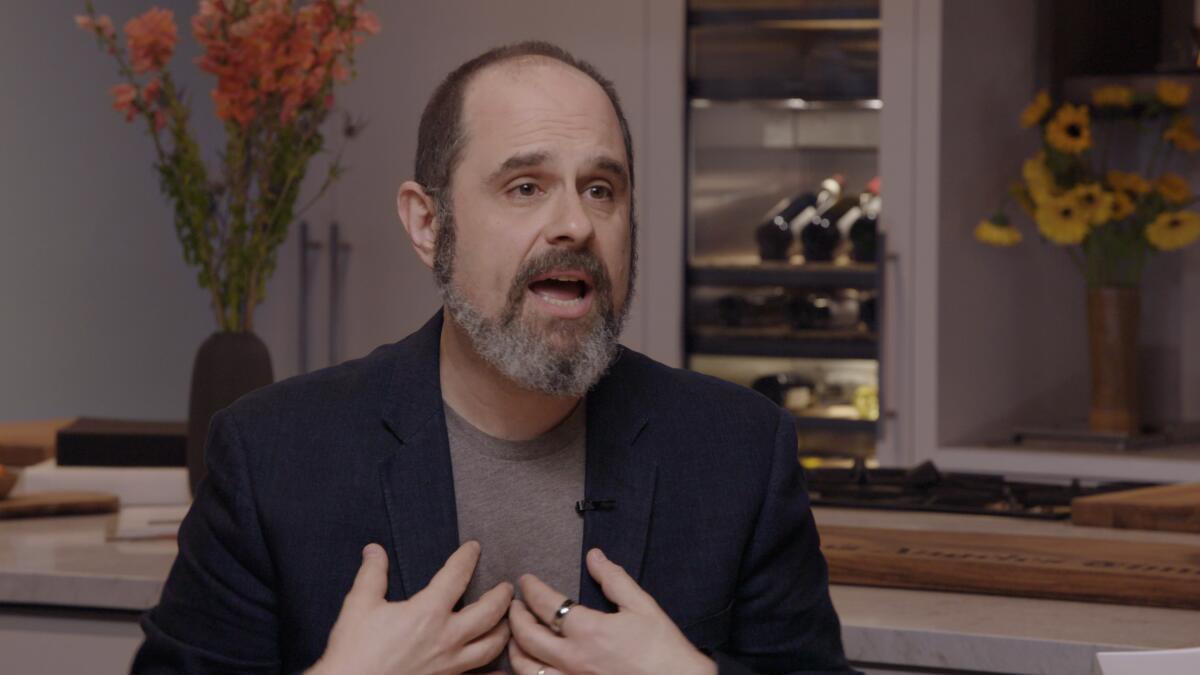
Mazin: We have to acknowledge as showrunners, we’re in a weird position because we’re writers, so we’re part of a union. We’re also management. There’s a pretty good legal argument that we should be kicked out of the union entirely. But as we’re in it, we have a responsibility not only to treat the people that work for us well and to take care of them, but we also have a responsibility to acknowledge how many of us there are that are terrible. There are a lot of bad showrunners, and when I say bad I don’t mean they’re bad in talent, I mean that they’re bad people. They’re doing bad things. They’re not taking care of the people around them. I don’t have a writing staff, I write alone, but I take care of the people around me that are supporting me, I take care of the people that are working on the show. And to the extent that if I do run a show where there’s a room, I’m not doing any of that mini room ... I mean, none of it. There won’t be a show. And I think, honestly we underestimate how much power we have at the beginning. Later, not as much, but at the beginning?
Hoffman: It all feels like a mysterious, untouchable thing when you’re young and coming up, until you experience the producing and being a part of all of that. But I do think we have to pull up and make that happen because it won’t happen beyond us in any way. It’s really [about] giving people a push forward, like giving your writer’s assistant a script to do, or something like that. Do whatever you can do to help.
Restructuring, layoffs and show cancellations at Hollywood studios, as well as the risk of a pending writers strike, slowed film and TV production.
What’s been the temperature in the room, Liz? What is your staff talking about?
Tigelaar: It’s interesting because when we struck in 2007, at least from my perspective, the things we were striking for felt conceptual and heady. Now I think every single writer is touched by what’s happening. I think [we need] to stand up and say, “You know what, I’m not going to link the writers’ pay to production, because as we all know, production might never happen, or it might happen a year from now.” And in what other industry can people take a job and not know when they’re going to get paid? People need to get paid when they do the work, and they need to be paid for the work that they do. And you, as a showrunner, have to stand up for that.
The mini room people are — it’s so abused. And I’ve noticed even if you’re lucky enough to have a full room, they leave and then you are on set as the showrunner to do every single thing. That is more than one person could possibly do. [Or] if you’re lucky, maybe you get one or two people to stay. It’s not that assembly line of each writer goes and has the experience to produce their scripts. And then what you have are people moving up so fast, or at an intense deficit. And they don’t even know it, because they’re so happy because they did four episodes, and then became a story editor, and then skipped a co-producer, and then became a supervising producer, and they have never been on set before. And they are going to be poised to create a show and not have the ability to run it.
The 2023 writers’ strike is over after the Writers Guild of America and the Alliance of Motion Picture and Television Producers reached a deal.
Lawrence: Plus if you’re young and you get a chance to create a show and it doesn’t go well, it’s not like “Hey, it’s their first time.” Immediately people are like, “Oh, this is not for this person.” How could you possibly know this if they’ve done this for the first time ever? They’re young. You get better through failure.
Tigelaar: Yeah, the beauty of being a TV writer, to me, is that it’s a job where there were steps of a ladder, and even though it’s an insecure job in terms of: your show could be canceled, it’s not rooted in security, but it’s made up for in...
Mazin: Structure
Tigelaar: And that there is a system and if you go up the rungs of the ladder, you can be successful, you can be mentored, you can learn and you can be prepared to do it yourself. And all of that has been stripped away, and it’s hurt everybody.
Nabers: And getting success really quickly. And not really ever being able to write a script and then being empowered to run a show. ... There’s a lot of people like that too, where you’re like “This is crazy.”
Lawrence: I’m of a generation that if you saw “Co-EP” next to someone’s name or even executive story editor, you had an assumption about a level of experience and that’s all 100% gone.
Mazin: So things are going great!
Youssef: To your point though, there is no other industry where — because they own it forever, they get money every month, and you get money once.
Mazin: They don’t even have to pay for storage.
Lawrence: There’s people here that still get those checks for like $38 or $420 for something you wrote 1,000 years ago. I still get checks for the one “Friends” episode I wrote. It keeps coming. “The One With the Candy Hearts,” what’s up?
Mazin: This is the other reason we’re going on strike. To stop this. This has to stop. It’s just pure chaos.
More to Read
Inside the business of entertainment
The Wide Shot brings you news, analysis and insights on everything from streaming wars to production — and what it all means for the future.
You may occasionally receive promotional content from the Los Angeles Times.
